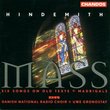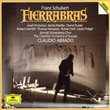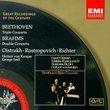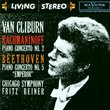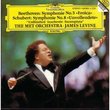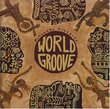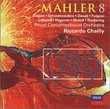| All Artists: Bayerischen Rundfunks Title: Mozart - Requiem / McLaughlin, M. Ewing, Hauptmann, Bayerischen Rundfunks, Bernstein Members Wishing: 0 Total Copies: 1 Label: Deutsche Grammophon Release Date: 7/20/1989 Genre: Classical Styles: Opera & Classical Vocal, Historical Periods, Classical (c.1770-1830), Early Music Number of Discs: 1 SwapaCD Credits: 1 UPC: 028942735323 |
Search - Bayerischen Rundfunks :: Mozart - Requiem / McLaughlin, M. Ewing, Hauptmann, Bayerischen Rundfunks, Bernstein
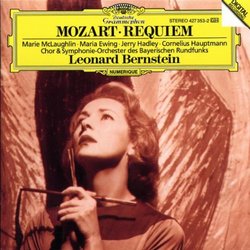 | Bayerischen Rundfunks Mozart - Requiem / McLaughlin, M. Ewing, Hauptmann, Bayerischen Rundfunks, Bernstein Genre: Classical
As with his performance of the Mass in C Minor with these same forces, Leonard Bernstein provides another outstanding performance, certainly one of the very finest available of this oft-recorded music. Without indulging in... more » ![header=[] body=[This CD is available to be requested as disc only.]](/images/attributes/disc.png?v=a4e11020) ![header=[] body=[This CD is available to be requested with the disc and back insert.]](/images/attributes/disc_back.png?v=a4e11020) ![header=[] body=[This CD is available to be requested with the disc and front insert.]](/images/attributes/disc_front.png?v=a4e11020) ![header=[] body=[This CD is available to be requested with the disc, front and back inserts.]](/images/attributes/disc_front_back.png?v=a4e11020) |
Larger Image |
CD DetailsSynopsis
Amazon.com As with his performance of the Mass in C Minor with these same forces, Leonard Bernstein provides another outstanding performance, certainly one of the very finest available of this oft-recorded music. Without indulging in the sort of Romantic mannerisms that sometimes afflict his Mozart, Bernstein urges his Bavarian forces on to heights of passion and intensity that never upset the music's natural proportions. A magnificent disc. --David Hurwitz Similar CDs
Similarly Requested CDs
|
CD ReviewsPowerful requiem...but... A. Michaelson | Bay Area, CA | 08/04/2001 (4 out of 5 stars) "Mozart's requiem mass is one of the most sad, yearning, powerful pieces of music ever written. In this particular performance, Bernstein conducts in typical fashion, bringing power and emotion to this incredible Mozart masterpiece. If you want a great performance that draws out all the intense feelings of anxiety, depression, and fear from this piece, then this recording is for you. It is definitely one of my favorites. Unfortunately two flaws, which are important in my opinion, prevent me from giving this recording 5-stars. First off, the voices are too loud, so loud that at some points the orchestra is almost obscured. Sure, the voices are the central focus of the piece, but the orchestral score is essential for setting the mood, and a few times the chorus is just too overpowering. Second, the tempos are a bit sluggish, probably not as Mozart would have wanted. I am one who personally prefers quicker tempos for music of the classical period, because it gives it a more authentic flair. This is otherwise a great recording, but for other great ones also try one of Karajan's and the new one from teldec and the Boston Baroque." Bernstein thumbs his nose at "period" performances J. Buxton | Waltham, MA United States | 12/16/1999 (5 out of 5 stars) "This is a wonderful disc, but if you like "period" recordings, this is not the disc to buy. Unlike period performances Bernstein uses a large orchestra and the tempi he chooses are significantly slower than any other recording I've heard. But what stays with me about this performance is the emotional tension he draws from everyone involved. It is very involving for the listener and the electricity of a live performance also comes through." Not the pinnacle, but worthwhile nonetheless mark801 | Dallas, TX | 04/10/2002 (4 out of 5 stars) "Considering how many big-name conductors stumble and fall on this one...Von Karajan and Neville Marriner being two notable examples, in my opinion...it was a delight to hear Bernstein capturing the essence of Mozart's last ouevre. Working with fairly significant forces, Bernstein nonetheless achieves clarity and convinces the listener, for the most part. The Recordare stands out as the most sublime movement on this CD; the Dies Irae, the Hostias, the Benedictus, and the Agnus Dei are also satisfying.A couple of quibbles; the Introit is a bit slow for my tastes; the opening soloist on the Tuba Mirum is crosses over from emotional expressiveness into melodrama, particularly with his excessively rolled "r's"; and the Lacrimosa, arguably the most beautiful movement of the entire work, is much too slow. What was he thinking here? The tempo he's chosen has caused some of the textual material to come off as completely absurd simply because it's so slow it sounds ridiculous.My favorite recording of the Requiem continues to be Robert Shaw's, although if you like the kind of thing John Eliot Gardiner does, that version is also not without its deep satisfactions."
|

 Track Listings (14) - Disc #1
Track Listings (14) - Disc #1

